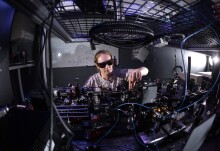

Device aims to extend the benefits of minimally invasive surgery - <em>News Release</em>
Issued by the Wellcome Trust
See also...
Institute of Biomedical Engineering
External sites:
(Imperial College is not responsible for the content of these external internet sites)
Saturday 29 December 2007
Minimally Invasive (or so called 'keyhole') surgery was one of the great medical advances of the twentieth century, allowing sophisticated surgical operations to be carried out with little trauma. However, there are limits to the types of procedures that can be carried out this way.
A new surgical robot to be developed, the 'i-Snake', aims to provide a platform to extend the use of this surgical technique breaking new ground across the fields of surgery and engineering. The i-Snake will incorporate state of the art imaging and intuitive manipulation technologies, allowing surgeons to carry out more complex and demanding procedures within the body, previously only possible using more invasive surgical approaches.
A world renowned team from Imperial College London, has been awarded over £2.1 million from the Wellcome Trust to develop the i-Snake over the next four years. The multidisciplinary research team includes: Professor Lord Ara Darzi of the Division of Surgery, Oncology, Reproductive Biology and Anaesthetics, one of the UKâs leading surgeons in the field of Minimum Invasive Surgery (MIS), and Professor Guang-Zhong Yang who is the Director of Medical Imaging and Robotics at Imperial's Institute of Biomedical Engineering.
Using special motors, multiple sensing mechanisms and imaging tools at its 'head', the flexible i-Snake robot will act as the surgeonâs hands and eyes, allowing them to navigate difficult and restrictive regions of the body. Among the many possible applications of i-Snake are the clinical investigation of the alimentary tract, or complex, multi-vessel coronary bypass surgery.
Lord Darzi comments: "The unrivalled imaging and sensing capabilities coupled with the accessibility and sensitivity of i-Snake will enable more complex diagnostic and therapeutic procedures than are currently possible. The cost benefits that i-Snake will introduce include earlier, cheaper and less invasive treatment, faster recovery and procedure times and intangible benefits through an increase in patient care and quality of life."
Professor Yang said: "The i-Snake uses a biologically-inspired articulation design to allow flexible articulation of the instrument tip. It combines both intra- and inter-operative image guided surgical navigation with dynamic active constraints for improved surgical precision and safety. The project represents a unique cross-disciplinary collaboration within Imperial College in imaging, sensing and robotics."
Dr Ted Bianco, Director of Technology Transfer at the Wellcome Trust, said: "Gone are the days when the surgeonâs knife ruled in the operating theatre. The future of surgery is in smart devices like i-Snake."
Ends
Media enquiries
Mike Findlay
Wellcome Trust Media Office
T +44 (0)20 7611 8612 / 07878893588
E m.findlay@wellcome.ac.uk
Katrina Nevin- Ridley
Head of Media, Wellcome Trust
T: +44 (0)20 7611 8540 / 07973481485
E: k.nevin-ridley@wellcome.ac.uk
Notes to editors
'I-Snake' is an Imaging-Sensing Navigated and Kinematically Enhanced (i-Snake) Robot.
The Wellcome Trust is the largest charity in the UK. It funds innovative biomedical research, in the UK and internationally, spending around £500 million each year to support the brightest scientists with the best ideas. The Wellcome Trust supports public debate about biomedical research and its impact on health and wellbeing.
Professor the Lord Darzi of Denham KBE is the Parliamentary Under Secretary of State for the Lords at the Department of Health. In addition to his ministerial duties Professor Lord Darzi maintains two full days of research and clinical activities at Imperial College where he holds the Paul Hamlyn Chair of Surgery at Imperial College London and is an honorary consultant at St Mary's Hospital and The Royal Marsden. Professor Lord Ara Darzi has pioneered many new techniques and technologies, including the first fully integrated surgical robotics systems in the UK the âda Vinci Systemâ â a teleoperative machine featuring wristed instruments with seven degrees of freedom which has allowed surgeons to perform procedures with increased precision.
Imperial College London
Rated as the world's fifth best university in the 2007 Times Higher Education Supplement University Rankings, Imperial College London is a science-based institution with a reputation for excellence in teaching and research that attracts over 12,000 students and 6,000 staff of the highest international quality. Innovative research at the College explores the interface between science, medicine, engineering and management and delivers practical solutions that improve quality of life and the environment - underpinned by a dynamic enterprise culture.
With 66 Fellows of the Royal Society among our current academic staff and distinguished past members of the College including 14 Nobel Laureates and two Fields Medallists, Imperial's contribution to society has been immense. Inventions and innovations include the discovery of penicillin, the development of holography and the foundations of fibre optics. This commitment to the application of our research for the benefit of all continues today with current focuses including interdisciplinary collaborations to tackle climate change and mathematical modelling to predict and control the spread of infectious diseases.
The College's 100 years of living science will be celebrated throughout 2007 with a range of events to mark the Centenary of the signing of Imperial's founding charter on 8 July 1907.
Article text (excluding photos or graphics) available under an Attribution-NonCommercial-ShareAlike Creative Commons license.
Photos and graphics subject to third party copyright used with permission or © Imperial College London.





